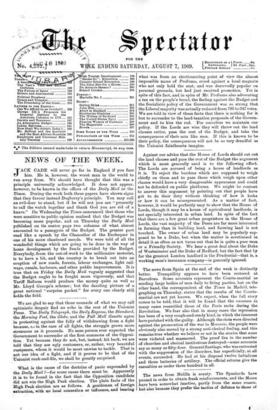Against our advice that the House of Lords should cut
out the land clauses and pass the rest of the Budget the argument which is most generally used is to the following effect. The Lords are accused of being a house of landlords as it is. To reject the burdens which are supposed to weigh chiefly on them and to pass those which weigh upon other classes would have a very disagreeable appearance and could not be defended on public platforms. We might be content to answer this argument by pointing out that people have got to do their duty without thinking of how it looks or how it can be misrepresented. As a matter of fact, however, it would be perfectly easy to show that the House of Lords, though it may be a house of agricultural landlords, is not specially interested in urban land. In spite of the fact that there are a few great urban proprietors in the House of Lords, the vast majority of the Peers are far more interested in farming than in building land, and farming land is not touched. The owner of urban land may be popularly sup- posed to be a Duke, but when the matter is scrutinised in detail it as often as not turns out that he is quite a poor man or a Friendly Society. We hear a great deal about the Duke of Westminster and the Duke of Bedford, but the fact that by far the greatest London landlord is the Prudential—that is, a working man's insurance company—is generally ignored.






































